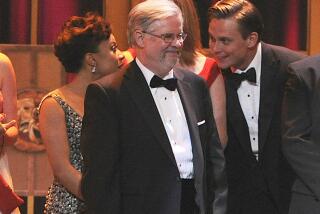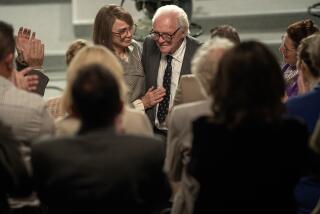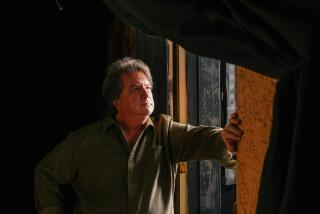Review: ‘The Father’ showcases Anthony Hopkins at his devastating best
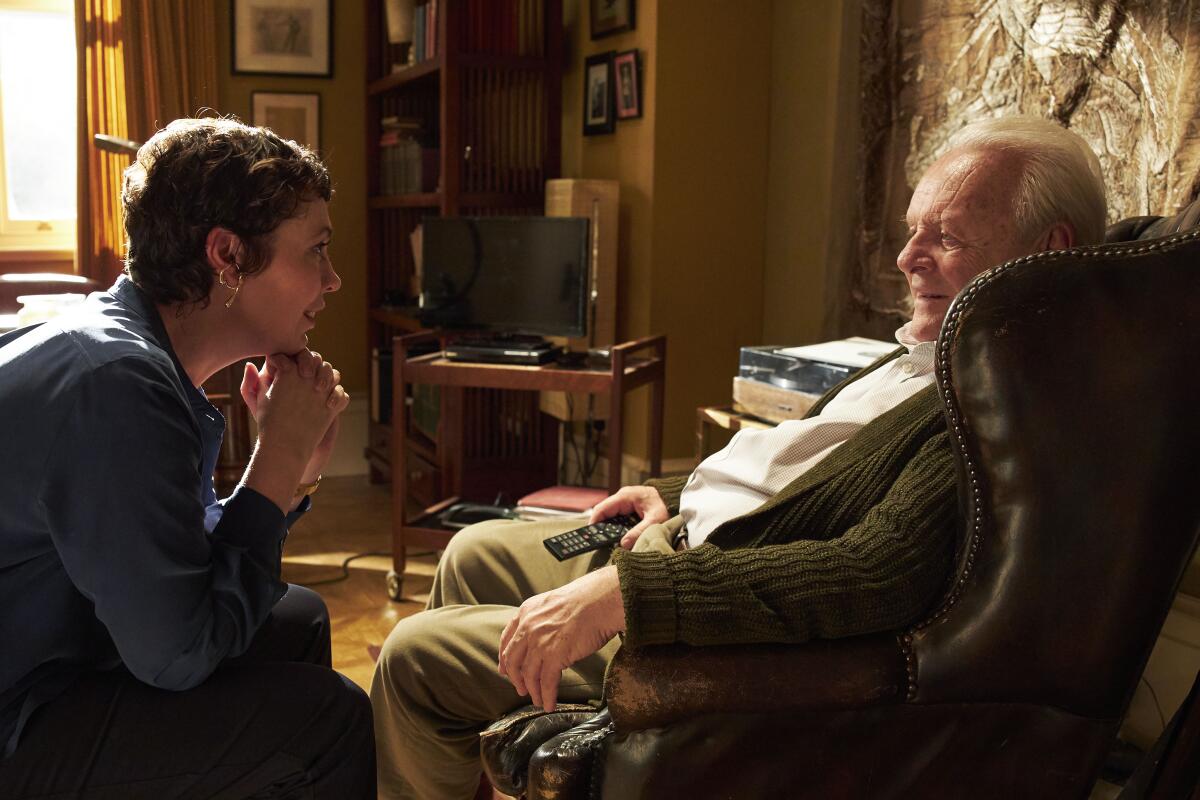
The Times is committed to reviewing theatrical film releases during the COVID-19 pandemic. Because moviegoing carries risks during this time, we remind readers to follow health and safety guidelines as outlined by the Centers for Disease Control and Prevention and local health officials.
In “The Father’s” house are many rooms, all of them beautifully appointed with details so sharp and precise that you might be startled to find them vanishing a few moments later: Didn’t those backsplash tiles look different a minute ago? Wasn’t there a lamp on that side table? The French writer-director Florian Zeller, adapting his internationally acclaimed play for the screen, has a meticulous eye and a keen sense of mischief, which doesn’t lighten so much as heighten the implacable tragedy at the heart of this story. The moment-to-moment pleasures of trying to decipher the plot give way to crushing futility; you’re left sifting through the pieces of a puzzle that’s almost too painful to solve.
Those pieces have been plucked from the life of an 80-year-old Englishman named Anthony. Known as André in the play, he has been renamed here in honor of his interpreter, Anthony Hopkins, who repays it with a performance of extraordinary psychological cunning and emotional force. We first encounter Anthony in a darkened London apartment, listening to a recording of Henry Purcell and John Dryden’s 1691 dramatic opera “King Arthur, or the British Worthy.” Before long his daughter, Anne (Olivia Colman), comes in and the music stops, though not before the opening lines of an aria have rung out: “What power art thou, who from below / Hast made me rise unwillingly and slow / From beds of everlasting snow?”
The opera reference is a studied choice but an apt one: Soon enough, a deep, menacing chill descends on this movie like a fog and stays there, wrapping around the mind of a man trying to shake off his slumber. Less an unreliable narrator than an unreliable observer, Anthony is in a rapidly advancing state of dementia, a condition that manifests itself in fugue states, memory lapses and volatile fits of temper. His fierce tantrums have recently burned through a series of in-home nurses, leaving Anne at her wits’ end. This much of the situation is clear enough, mainly because it keeps getting reiterated for Anthony’s benefit — patiently by Anne, who tries to coax him into behaving , and more resentfully by her husband, Paul (Rufus Sewell), who occasionally turns up to protest the disruption of their once stable, comfortable lives.
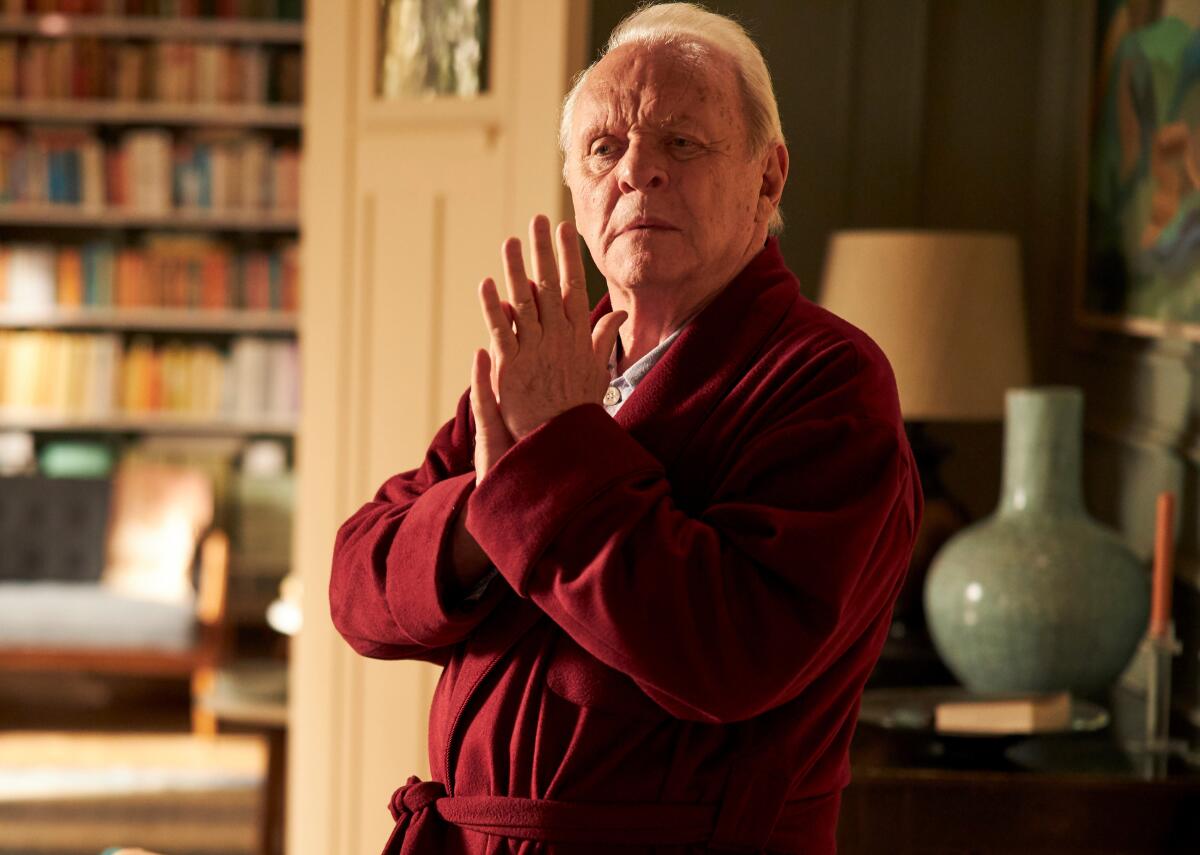
Anthony, for his part, has a rather different understanding of who’s intruding on whom. His daughter sometimes becomes a stranger. He is visited and attended to by others he doesn’t recognize, played with gently obliging smiles by actors including Imogen Poots, Mark Gatiss and Olivia Williams. (In addition to the doubled Anthonys, the casting of two equally superb Olivias slyly compounds the confusion.) He mutters and rants about unwanted caretakers and stolen possessions, namely the watch that keeps vanishing from his wrist — an effective if on-the-nose nod to his slippery sense of time. He reacts to each new piece of information with skepticism and fascination as if he were an investigator making a surprising discovery rather than a man losing his grip on reality.
“The Father,” in other words, is both a detective story and a study in confinement, a mystery set within the labyrinthine recesses of a deteriorating mind. The original play (whose English translator, Christopher Hampton, is credited alongside Zeller for the screenplay) availed itself of the natural abstractions of theatrical space, turning the stage into a psychological hall of mirrors. But Zeller, making an elegant and incisive feature debut, finds an ideal equivalent within the more realistic parameters of the movie screen. The airlessness that stifles so many stage-to-screen adaptations only serves to reinforce this film’s mood of entrapment, barely diminished by the opera selections and the recurring strains of Ludovico Einaudi‘s original score. The imposing physicality of the apartment makes it that much more startling when the movie begins to undermine its own premises.
I mean premises quite literally. The flat features a long hallway that seems to stretch toward infinity, with doors that lead into interconnected, sometimes interchangeable-looking rooms. Ben Smithard’s deep-focus widescreen compositions with restrained lighting and slightly muted colors confound your sense of direction, even as they invite you to rummage through the details of Peter Francis’ intricate production design. And as those details — the tiles and that painting, the pottery and the furniture — begin to shift imperceptibly from scene to scene, our understanding of time, space and reality begins to rupture in concert with Anthony’s. (Among recent movies, “The Father” would make quite a haunted-house triple bill with “Relic” and “I’m Thinking of Ending Things,” which also dramatize cognitive decay via compulsively mutating decor.)
How closely do Zeller’s formal conceits approximate the real, lived experience of dementia? The answer to that question is fundamentally unknowable and possibly irrelevant; as we’ve seen from “Away From Her,” “Still Alice” and other fine dramas about the impact of Alzheimer’s disease on a family, this kind of radically subjective storytelling isn’t a prerequisite for empathy or emotional truth. Even still, the rigorous interiority of “The Father” compels your attention: If narrative cinema is largely predicated on the illusion of seamlessness, there’s something apt about the way Zeller both upholds and shatters that illusion, bridging the narrative gap across a series of jarring discontinuities. You can imagine the mind doing something similar, struggling for lucidity in the wake of mounting incoherence.
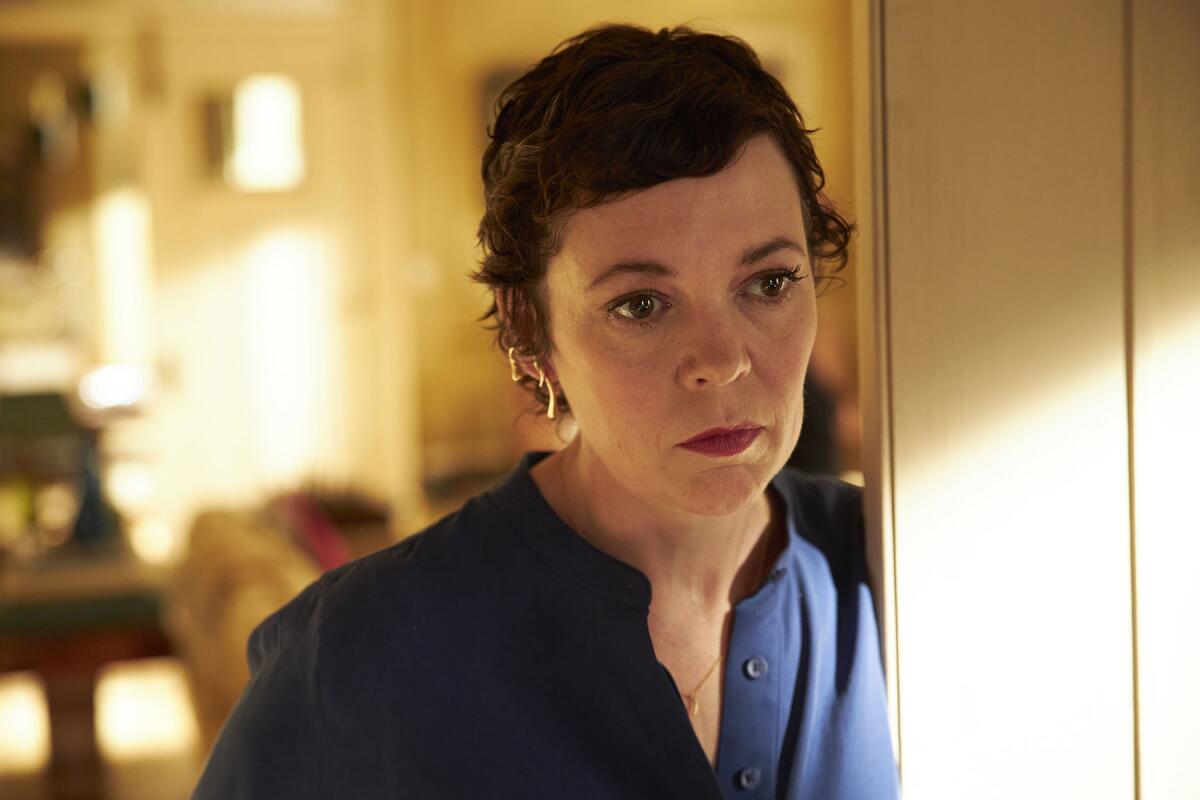
But you don’t need to imagine it, because for the entirety of the movie’s fleet 97-minute running time, Hopkins embodies it. His Anthony can be vulnerable and fierce, broken and defiant: His moments of verbal acuity and self-aware humor exist on a continuum with his equally sudden lapses into oblivion. In one scene, he disarms a visitor with flirtatious charm and even does an impromptu dance only to turn the tables with stinging viciousness: It’s not clear if this is the real Anthony, in full, ferocious possession of his faculties, or an unrecognizably distorted version of him or some strange conflation of both. We see both the singular, towering personality he once was and the fumbling fragility to which he will soon be reduced.
If it feels redundant to invoke Shakespeare with regard to this particular actor, it also seems like more than happenstance that Hopkins, having recently played King Lear in a 2018 TV adaptation, has now stepped into a role with obvious Learian overtones. This is, as its title suggests, the story of not just a disintegrating psyche, but also a disintegrating relationship between a father and a daughter whose love he can no longer see or feel. “The Father” may be a remarkable feat of sustained identification, but beyond the margins of Anthony’s experience — and primarily in the figure of Anne, whom Colman brings to aching, tremulous life — we catch glimpses of other characters and other stories: a terrible accident, a broken marriage, a second chance at love.
These stories may be half-buried memories or hallucinatory projections, but they are real enough to mark “The Father” as more than just one man’s tragedy. The film’s final embrace is a quietly astounding vision of grace in solitude, and it harks back to that opening aria, with its invocation of eternal winter and the unheard rejoinder that follows: “ ’Tis Love, ’tis Love, ’tis Love that has warm’d us.”
‘The Father’
Rating: PG-13, for some strong language, and thematic material
Running time: 1 hour, 37 minutes
Playing: Starts Feb. 26 at Vineland Drive-In, City of Industry; available March 26 on PVOD platforms
More to Read
Only good movies
Get the Indie Focus newsletter, Mark Olsen's weekly guide to the world of cinema.
You may occasionally receive promotional content from the Los Angeles Times.
